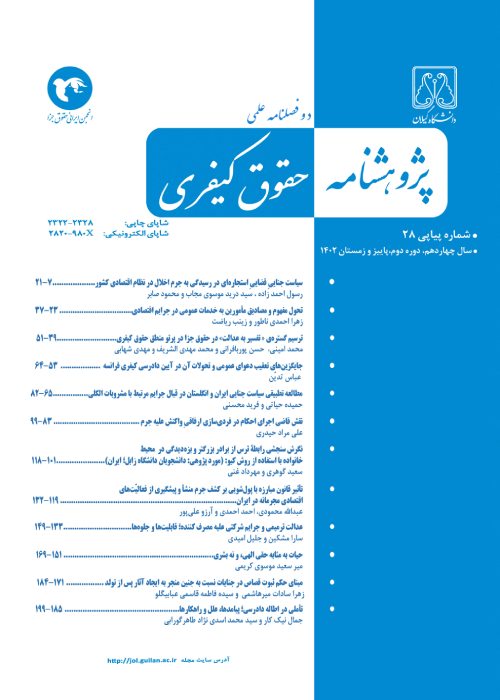The Criminal Minimalism in the Reduction of the Ta’zir Imprisonment Punishments Act (2020) and the Challenges thereof
The Act of Reduction of the Ta’zir Imprisonment Punishments (2020) has adopted minimalistic attitude regarding imprisonment. Prison overcrowding, which is a result of increment in prison population and incarceration policies has increased the costs of custody of inmates and led to crisis in the management of prisons. Meanwhile, The Act of Reduction has sought to reach criminal minimalism and decarcerate prison population by reducing the imprisonment of some criminal offences such as kidnapping, making lots of others like defalcation, forgery in unofficial documents, fraud, and some cases of theft forgivable and shrinking the minimum and maximum of the imprisonment to half. However, precipitancy in codification of this Act and extreme attitude towards decarceration has marginalized the moral attraction of law and justice, leading to the creation of the presumption of commodification of punishments and has developed the atmosphere of bargaining to resolve disputes which would undermine deterrence of the punishments.
The Act of Reduction of the Ta’zir Imprisonment Punishments (2020) implementing fundamental amendments in the Islamic Penal Code (2013) has adopted minimalistic attitude towards punishments and specifically imprisonment. Prison overcrowding, which is a result of increment in prison population and incarceration policies has increased the costs of custody of inmates and led to crisis in the management of prisons. Meanwhile, The Act of Reduction has sought to reach criminal minimalism and decarcerate prisons’ population by reducing the imprisonment of some criminal offenses such as kidnapping and making many others including defalcation, fraud and specific sorts of theft with definite value forgivable and shrinking the minimum and maximum of the imprisonment to half in 4th til 8th degree T’azir punishments and facilitating the application of mitigating factors. Accordingly, the rules on plurality of the crime and recidivism have been completely evolved and the discretion of the courts in aggravating the punishment in cases of plurality and recidivism has been restricted. The Motto of the Act is that the experiment of imprisonment and the maximized use of it have been unsuccessful in providing the goals of the legislature and controlling criminality and therefore revising the old policies is an unavoidable necessity.
The methodology of the article is descriptive-analytical approach which has accomplished research on various literatures in criminal sciences (including books and articles) and the articles of the Act of Reduction of the Ta’zir Imprisonment Punishments and analyzed them.
The perspective of the Act of Reduction of the Ta’zir Imprisonment Punishments shows the insight towards decarceration is not an outcome of criminological or penological studies on the harmful consequences of prison and is in fact free of liberal approaches towards imprisonment. The enactment of the Act shortly after the enactment of the Act on Aggravating the Punishment of Pouring Acid and the Protection of the Victims (2020) which has considerably increased imprisonment and has prohibits the application of mitigating factors from the court and repealing of some articles of the aforementioned Act such as accelerating in crime according to the Act of Reduction depict a kind of chaos in the management of criminal policy making in Iran which on the one hand, tends to increase imprisonment and on the other hand, contemplates diminishing and decarcerating. Also, the enactment of the Act on Protection of the Juveniles (2020), which has unconventionally Increased the imprisonment even in unintentional offences, is another instance of such chaos. Indeed, three acts which were enacted shortly after each other, rival each other in approaches and attitudes of the legislatures, the reason being lack of a fixed expertise board in legislating, the main calamity in the legislation in Iran.precipitancy in codification of this Act, the lack of criminological and penological basis, extreme attitude towards decarceration paired with tendency towards financial punishments such as fines has marginalized the moral attraction of law and justice, leading to the creation of the presumption of commodification of punishments and has developed the atmosphere of bargaining to resolve disputes which would undermine deterrence of the punishments. Certainly, decriminalization and depenalization would be preferable to resolutions such as making the Ta’zir punishments forgivable and nonstandard decreasing them. Granting a vast authority to courts in order to mitigate criminal sanctions even in cases of plurality or recidivism, in which aggravating the punishment is mandatory, is ponderable and would practically confront the judges with the accusation of bias and nonconformity with neutrality.
The appropriate resolution to mitigate the problematic of the Act of Reduction would be revising it and omitting decreasing rules such as irregular halving the imprisonment and the mitigating institutions. The Act has been enacted without sufficient scientific studies just in order to decarcerate and lighten the burden of the justice system. It would be neither deterrent nor just in the current state and the criminal statistics show an increase in street crimes like theft and snatching after coming the Act into force which demonstrate the Act is unable to guarantee the general goals of the punishments including dispensing justice, protecting of the rights of victims, rehabilitating the offender and preventing the crime.
- حق عضویت دریافتی صرف حمایت از نشریات عضو و نگهداری، تکمیل و توسعه مگیران میشود.
- پرداخت حق اشتراک و دانلود مقالات اجازه بازنشر آن در سایر رسانههای چاپی و دیجیتال را به کاربر نمیدهد.



